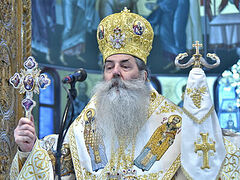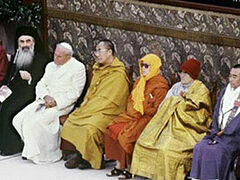—How should we view ecumenism? Is there any documentation in the Russian Orthodox Church specifying its meaning, and how should we deal with the ecumenists?
—I think it could be useful to read the enactment of the Bishop’s Council from 2000 regarding the relationship with the heterodox, where the attitude of the Russian Orthodox Church towards the heterodox has been described in great detail. As for the word “ecumenism,” it is too complex a notion, with either positive or negative definitions. We believe in the One Holy Catholic and Apostolic Church. We may also choose to call the Church Universal, or including all people living in the world. I am not speaking here of the Ecumenical Patriarchate but about the very nature of the Church, which is Holy, Catholic/Universal, and Apostolic. Naturally, it is also one and whole.
Now, the word “ecumenism” is derived from the Greek word ecumene, or “οἰκουμένη,” meaning “the universe.” The ancient Eastern Patriarchates called themselves the “Universal Patriarchates”, since their authority spread first throughout the Roman Empire and later to the whole Byzantine Empire, which was also call the “ecumene.” Namely, it meant the Greek ecumene, or the universe inhabited by Greeks. In this respect, the ecumene is the world settled by the corresponding citizenry. Afterward, because there was neither Greek or Jew (Colossians 3:11) in Christ, it was Christianity that triumphed over nationalism and became a universal religion that extends over all people—the Jews, the Greeks, the Scythes, the Sarmat, the Slavs, etc… The word “universal” (ecumenical) assumes that the Church is called to announce the good news of Jesus Christ to the ends of the earth, to the populated limits of human habitation. Christ sends His disciples away telling them, Go therefore and make disciples of all the nations, baptizing them in the name of the Father and of the Son and of the Holy Spirit, teaching them to observe all things that I have commanded you; and lo, I am with you always, even to the end of the age. Amen (Matthew 28:19-20). The Church is ecumenical by its very nature, striving to preach the Gospel to anyone, anywhere, and at any time.
Another matter is a particular movement of the twentieth century attempting to artificially unite the inherently different denominations. This phenomenon, when people fail to engage in theological dialogue, is condemned. I will offer the following example: If we want to be right on target, we have to refocus the lens. Modern ecumenism is peculiar in that it changed its lens, so its vision is blurred and lacks clarity. Behind its blurry image, it conceals the desire to smooth over the burden of the centuries-old problems as opposed to resolving them. The problems remain unsolved, as if swept under the carpet. That’s why when you see anti-ecumenists, they are typically the ones waging war against the movement of the twentieth, early twentieth centuries. That movement is designed to level out the problems through a formalistic and administrative merger of some denominations for the love of tolerance, instead of making the initial mission of the Apostolic Church a reality.
—A good friend of mine was influenced by her husband to convert to another faith, but she seems to have doubts as to whether she made the right decision.
—Sometimes we make decisions that are influenced by certain external factors: family circumstances, personal grievances, or ignorance. Later comes the realization that faith is intrinsically motivated, and then we experience an inner struggle. The Church always gives man a second chance. There was an institution of penitents in the ancient Church—those who believed in Christ and had received baptism, but later, under some external pressure or threat of death, made a sacrifice to the gods, but repented and sought forgiveness from the Christians entering the church. They had to stand beside the church entrance for a long time among the rest of the penitents. Eventually they were allowed to rejoin the Church.
Even in ancient times, beginning from the third century we observe the rank of the penitents, whereas in the fourth century, St. Basil the Great set up orders that specified the duration of penitent’s waiting period, depending on the severity of his digression or his journey into a far country (compare: Luke 15:13). It already suggests a certain penitential discipline.
The Church certainly gives one another chance, but this return should be voluntary. A penitent must fully grasp the significance of his transgression and become firmly established in the faith to which he desires to return. That’s why the Russian Orthodox Church organizes special reunification groups for the needs of apostates wishing to return. It also has a specific order of service for the admission of people of different faiths to the Church. It assumes that a person, whether he is returning to or joining the Church, will receive a basic knowledge of Orthodox beliefs and will act voluntarily, consciously, and maturely. What we provide to these people is the opportunity to repent and join the Church by comforting and supporting them, helping them to avoid the sinful memories of their past. On the other hand, we explain the benefits of true Orthodox faith, where we receive salvation through Christ.
To be continued…






